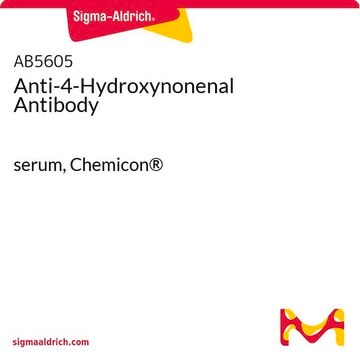393204
4-Hydroxynonenal
≥98% (HPLC), liquid, lipid peroxidation marker, Calbiochem®
Synonym(s):
4-Hydroxynonenal
About This Item
Recommended Products
product name
4-Hydroxynonenal, 4-Hydroxynonenal, CAS 75899-68-2, is a major aldehyde product formed by peroxidation of ω-6-unsaturated fatty acids that is regarded as a specific marker of lipid peroxidation.
Quality Level
Assay
≥98% (HPLC)
form
liquid
manufacturer/tradename
Calbiochem®
storage condition
OK to freeze
solubility
ethanol: 10 mg/mL
storage temp.
−70°C
InChI
1S/C9H16O2/c1-2-3-4-6-9(11)7-5-8-10/h5,7-9,11H,2-4,6H2,1H3/b7-5+
InChI key
JVJFIQYAHPMBBX-FNORWQNLSA-N
General description
Biochem/physiol Actions
Na+, K+-ATPase activity
Warning
Physical form
Reconstitution
Other Notes
Carini, R., et al. 1996. Biochem. Biophys. Res. Commun.218, 772.
Li, L., et al. 1996. Toxicol.Appl. Pharmacol.139, 135.
Siems, W.G., et al. 1996. Free Radic. Res.20, 215.
Ullrich, O., et al. 1996. Free Radic. Res.24, 421.
van Kuijk, F.J., et al. 1995. Anal. Biochem. 224, 420.
Esterbauer, H., et al. 1991. Free Radic. Biol. Med.11, 81.
Legal Information
Signal Word
Danger
Hazard Statements
Precautionary Statements
Hazard Classifications
Eye Irrit. 2 - Flam. Liq. 2
Storage Class Code
3 - Flammable liquids
WGK
WGK 3
Flash Point(F)
57.2 °F - closed cup
Flash Point(C)
14 °C - closed cup
Certificates of Analysis (COA)
Search for Certificates of Analysis (COA) by entering the products Lot/Batch Number. Lot and Batch Numbers can be found on a product’s label following the words ‘Lot’ or ‘Batch’.
Already Own This Product?
Find documentation for the products that you have recently purchased in the Document Library.
Customers Also Viewed
Our team of scientists has experience in all areas of research including Life Science, Material Science, Chemical Synthesis, Chromatography, Analytical and many others.
Contact Technical Service














